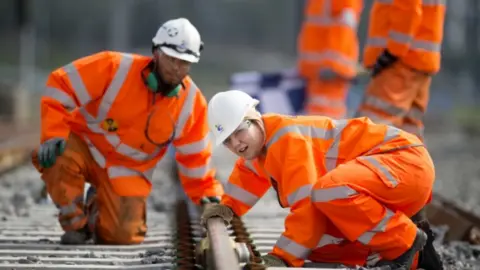Carillion pension scheme was 'ignored'
 Reuters
ReutersFor 10 years, the Carillion pension trustees tried to get the company to pay in more money to the scheme without success.
There was no agreement from 2008 onwards between the company and the trustees about the correct level of contribution over that decade and according to Robin Ellison, the chair of the trustees, there was precious little the guardians of the pension could do about it.
In fact, the bigger the deficit and the worse the company's fortunes, the more powerless the trustees felt.
Towards the end, they said they were prepared to give the company a pension contribution holiday to help alleviate the company's dire cash flow problem and convince the banks to throw Carillion a final lifeline.
In the end, it was academic as the government's refusal to support the company brought about Carillion's collapse anyway.
There are many facets to Carillion's collapse but the aspect in focus today before the joint Business and Pension committees in the commons was the balance between the ongoing interests of the company and the interests of past employees.
Robin Ellison put his finger on it when he said: "We have a dilemma. In one way we want as much money as we can. On the other hand, we don't want to destroy the company and getting that balance right is a challenge."
That balance was wrong, according to advice the trustees paid for themselves.
 Carillion
CarillionIn 2012, outside advisers said Carillion had prioritised growing earnings and supporting the share price ahead of the pension scheme.
The trustees were advised in writing that Carillion could "comfortably afford to make higher contributions".
When you are paying for advice you often get what you want to hear - and this was certainly music to the pension trustees' ear.
What is surprising is that the trustees could not use this report as a way of recruiting the Pensions Regulator, which does have the power to force companies to pay more, in their campaign for higher contributions.
The head of the Pensions regulator, Lesley Titcomb, should get her tin hat on before she makes her appearance before MPs. The Work and Pensions select committee chair, Frank Field has already described a written response to these questions as "tentative and apologetic".
The other thing we learnt today is that this post mortem will not be quick.
Sarah Albon, the head of the Insolvency Service which examines the circumstances in which companies go bust said investigations usually take 21 months but this one could take longer thanks to the "incredibly poor standard of record keeping at the company".
Déjà vu
There is already a sense of déjà vu about these proceedings.
As with the BHS inquiry, all of today's witnesses - the chair of the trustees, the Insolvency Service and the accounting watchdog, the Financial Reporting Council claim one thing in common.
Their area of responsibility was limited and their ability to influence the people running the company before it collapsed was negligible.
Those former bosses appear before MPs a week today which is when we can expect the heat on the grill to be really cranked up.
For 10 years, the Carillion pension trustees tried to get the company to pay in more money to the scheme without success.
